Landing Page SEO refers to the process of optimizing a website’s landing pages to rank higher in search engine results pages (SERPs). It involves various on-page and off-page optimization techniques, such as keyword research, content optimization, link building, and user experience (UX) optimization.
Landing Page SEO is crucial for businesses that rely on online traffic to generate leads, sales, and revenue. By optimizing landing pages, businesses can increase their visibility and attract more qualified traffic to their website, which can result in higher conversion rates and revenue.
In this article, we’ll discuss the key elements of Landing Page SEO and provide practical tips and best practices for optimizing landing pages. Whether you’re new to Landing Page SEO or looking to improve your existing strategies, this article has something for you.
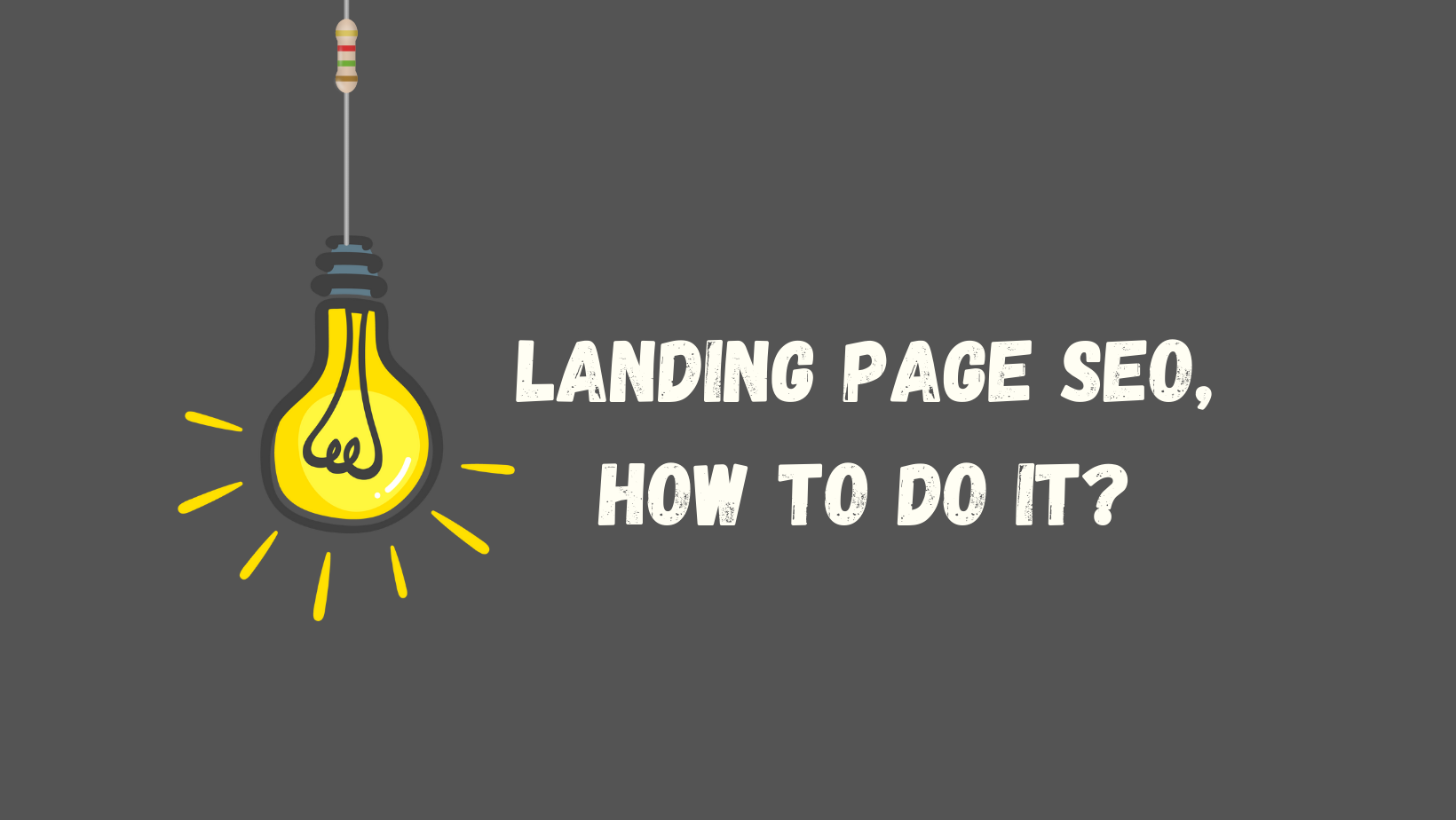
Page Contents:
Understanding the basics of Landing Page SEO
A landing page is a web page that is specifically designed to convert visitors into leads or customers. It is the first page that a user lands on after clicking on a link from an external source, such as a search engine, social media platform, or advertisement.
To create an effective landing page, it’s important to have a basic understanding of how search engines work. This includes knowledge of how search engines crawl and index web pages, and how they determine the relevance and authority of a page.
Keywords also play a critical role in landing page SEO. By including relevant keywords in the content of the landing page, you can increase the likelihood that it will appear in search engine results pages for relevant queries.
It’s important to use keywords strategically, however, to avoid over-optimization and penalties from search engines.
On-page optimization techniques can help to improve the performance of a landing page. This includes things like optimizing the page loading speed, using clear and concise headlines, using high-quality images and videos, and including strong calls to action.
By optimizing these elements of the landing page, you can improve the user experience and increase the likelihood of conversion.
Crafting an effective Landing Page
Crafting an effective Landing Page is crucial for any business that wants to increase its online presence and generate leads. It involves a multi-step process that requires a deep understanding of the target audience, their preferences, and their behavior.
One of the key aspects is user experience, which refers to the overall experience a user has when interacting with a website. To create a positive user experience, the Landing Page should be designed in a way that is easy to navigate, visually appealing, and engaging.
Designing an effective Landing Page is another essential aspect. The design should be based on the user’s needs, and the Landing Page must be optimized for various devices, including desktops, laptops, and mobile devices.
The layout should be clean and visually appealing, and the page should load quickly to ensure optimal user experience.
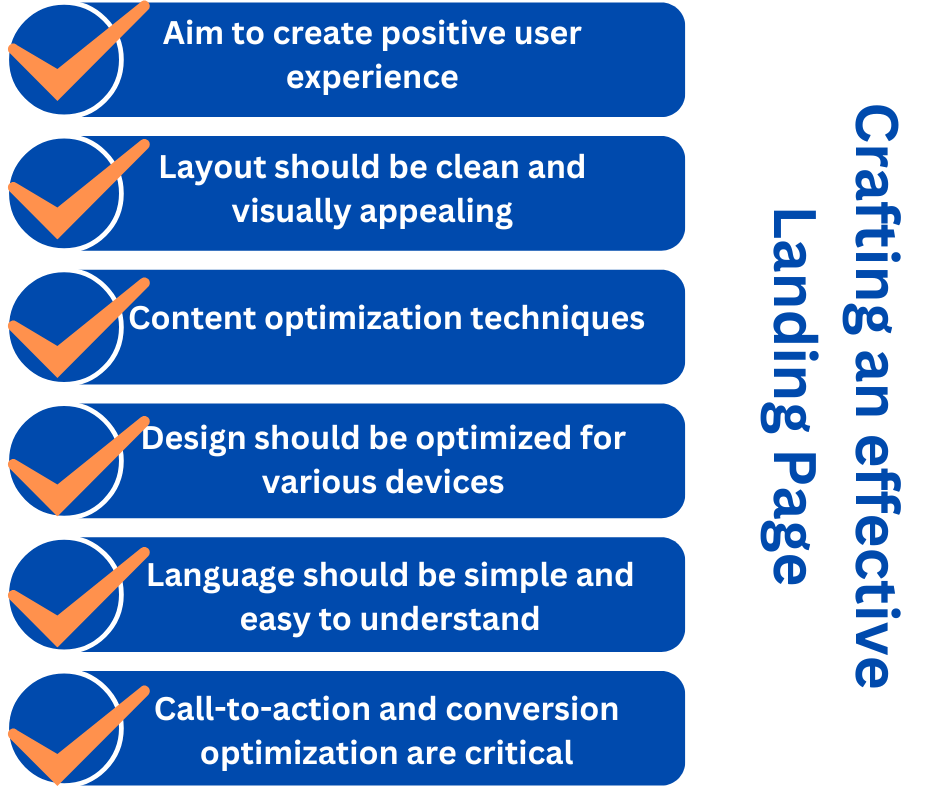
Content optimization techniques are equally important in crafting an effective Landing Page. The content should be informative, engaging, and aligned with the user’s needs.
The language should be simple and easy to understand, and the content should be structured into headings, subheadings, and bullet points to make it easy to scan.
Call-to-action and conversion optimization are critical components that cannot be overlooked. The call to action should be clear, compelling, and visible to the user.
The Landing Page must be optimized for conversion, which means that users should be encouraged to take specific actions, such as filling out a form, making a purchase, or downloading a resource.
To optimize conversion, the Landing Page should be tested regularly, and changes should be made based on user feedback and analytics.
Landing Page SEO best practices
When it comes to optimizing a landing page for search engines, several best practices should be followed. These practices include ensuring that the landing page is mobile responsive, optimizing website speed, utilizing effective meta tags and descriptions, and implementing link-building techniques.
1. Mobile responsiveness
Mobile responsiveness is a crucial factor in today’s world where most people use their smartphones to browse the internet.
A landing page that is not mobile-friendly will cause a poor user experience, resulting in a high bounce rate. Therefore, it is essential to ensure that the landing page is optimized for viewing on mobile devices.
2. Website speed
Website speed is another important factor to consider when optimizing a landing page. A slow-loading website can negatively impact user experience, resulting in a lower search engine ranking.
To optimize website speed, businesses should consider compressing images, minimizing HTTP requests, and optimizing code.
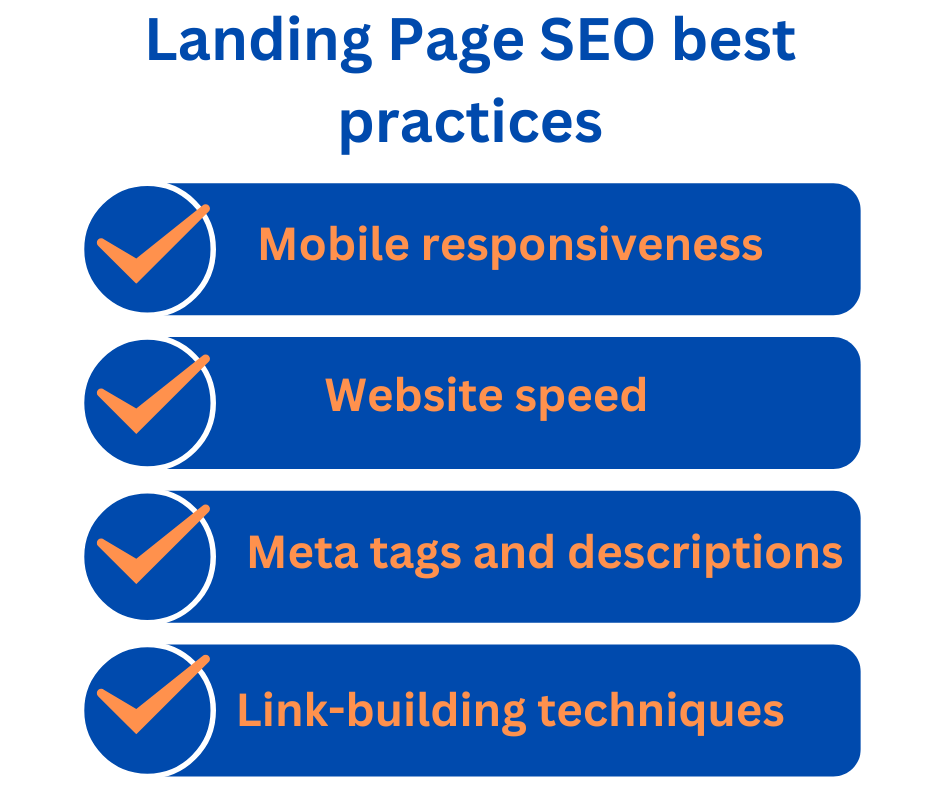
3. Meta tags and descriptions
Meta tags and descriptions are crucial elements in optimizing a landing page for search engines. These tags provide information about the landing page, which helps search engines understand the content and rank it accordingly.
It is essential to create unique and compelling meta tags and descriptions that accurately describe the content on the landing page.
4. Link-building techniques
Link-building techniques are another critical factor in landing page SEO. Building high-quality backlinks from reputable websites can significantly improve search engine rankings.
Businesses can utilize techniques such as guest posting, broken link building, and influencer outreach to build backlinks and improve their landing page’s visibility in search engine results.
By following this landing page SEO best practices, businesses can improve their online visibility, increase organic traffic, and ultimately drive more conversions.
Analyzing and measuring Landing Page SEO success
Analyzing and measuring the success of Landing Page SEO is a crucial aspect of any digital marketing strategy. It helps in understanding the effectiveness of the landing pages and identifying areas for improvement.
In this regard, Google Analytics plays a vital role as it provides valuable insights into the performance of the landing pages. By tracking key metrics, businesses can gauge how their landing pages are performing and make data-driven decisions to optimize their SEO strategy.
There are several key metrics that businesses can track to measure the success of their Landing Page SEO. These include bounce rate, average session duration, conversion rate, and click-through rate.
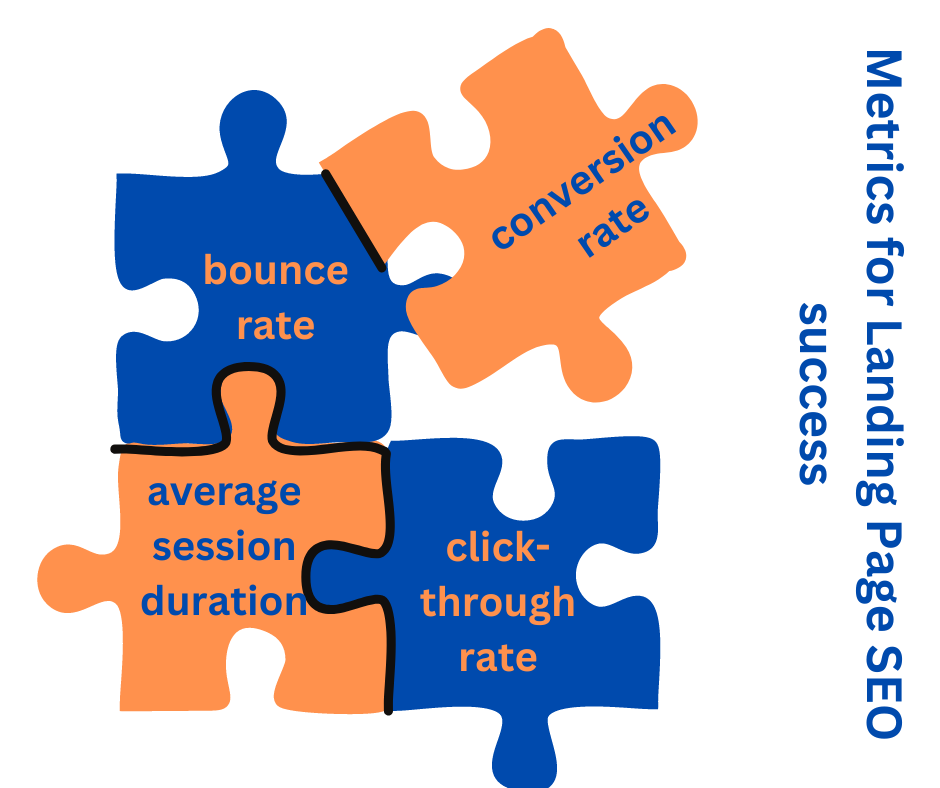
By monitoring these metrics, businesses can identify which pages are performing well and which ones need improvement.
There are several tools available that can help measure the success of Landing Page SEO. Google Analytics is a popular tool that can provide valuable insights into the performance of landing pages.
Other tools include SEMrush, Ahrefs, and Moz, etc. These tools help in tracking various metrics, such as keyword rankings, backlinks, and traffic, which can help businesses optimize their landing pages for better SEO performance.
Analyzing and measuring Landing Page SEO success is crucial for any business that wants to improve its online presence and generate more leads.
By using the right tools and tracking key metrics, businesses can optimize their landing pages for better SEO performance and achieve their digital marketing goals.
Common Landing Page SEO Mistakes To Avoid
When creating a landing page, there are several common SEO mistakes that you should avoid to ensure that your page is optimized for search engines.
1. Keyword stuffing
First and foremost, keyword stuffing is a big no-no. This involves overusing keywords on your page in an attempt to manipulate search engine rankings, which can result in penalties. Instead, focus on using keywords naturally and only where they make sense.
2. Duplicate content issues
Another mistake to avoid is duplicate content issues. This can happen if you have multiple pages with the same content, or if you copy content from other websites. Search engines penalize duplicate content, so it’s important to ensure that each page on your website has unique, high-quality content.
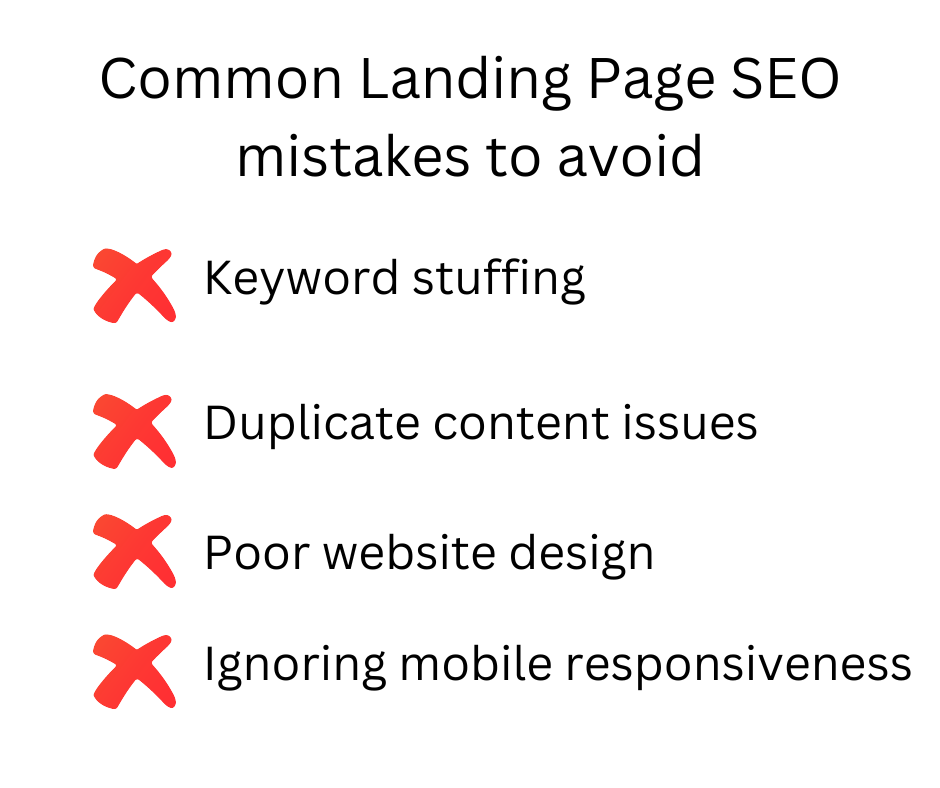
3. Poor website design
In addition, poor website design can also hurt your landing page’s SEO. If your website is difficult to navigate or has a confusing layout, visitors may leave your page quickly, which can increase your bounce rate and hurt your search engine rankings.
4. Ignoring mobile responsiveness
Ignoring mobile responsiveness is another common mistake that can hurt your landing page’s SEO. With more and more people accessing the internet on their mobile devices, your website must be optimized for all screen sizes.
If your landing page doesn’t look good on a mobile device, visitors may leave your page quickly, which can again hurt your search engine rankings.
Conclusion
Recap of key points
To summarize the key points discussed in this article, Landing Page SEO is a crucial aspect of online marketing that can significantly enhance the visibility and ranking of web pages in search engines.
The major factors that influence the search engine optimization of landing pages include keyword research, on-page optimization, user experience, and mobile responsiveness. By optimizing these elements, businesses can drive more traffic to their websites, generate leads, and boost conversion rates.
Future of Landing Page SEO
Looking ahead, the future of Landing Page SEO is likely to be shaped by advancements in artificial intelligence, natural language processing, and machine learning.
These technologies will enable search engines to better understand the context and intent behind user queries, thereby providing more accurate and relevant search results.
Therefore, businesses that stay up-to-date with the latest SEO trends and technologies will be better positioned to succeed in the increasingly competitive online marketplace.
Final thoughts and recommendations
In conclusion, Landing Page SEO is an ongoing process that requires continuous monitoring, testing, and optimization. Businesses that invest in SEO and prioritize user experience are more likely to achieve long-term success and growth.
To maximize the ROI of Landing Page SEO, we recommend conducting regular audits of landing pages, tracking and analyzing performance metrics, and staying informed about industry best practices and emerging trends.